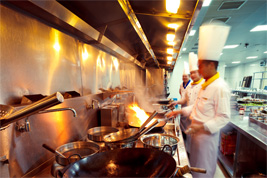Singapore has long been touted as a global city with a vibrant Food and Beverage (F&B) industry. But in the last few years, taking cognizance of the high proportion of foreigners in the country’s workforce, the Singapore government has implemented measures to encourage industries to raise productivity and work towards a healthier mix of locals and foreigners on its payrolls.
These measures include increasing the foreign workers levy, revising the tiered work visa regime and tightening the foreign workers quota. On a positive note, such measures have forced companies to innovate and upgrade their human resource practices for fulfilling their manpower needs.
But somehow, F&B industry in Singapore has lagged behind.
Problem Faced by the F&B Industry
 The renewed thrust on having a healthy mix of locals and foreigners in the country’s workforce means F&B outlets need to hire enough Singaporeans to be able to hire a foreign worker.
The renewed thrust on having a healthy mix of locals and foreigners in the country’s workforce means F&B outlets need to hire enough Singaporeans to be able to hire a foreign worker.
Colliers International – a global commercial real estate services organization – reveals that to hire a foreign worker, a F&B business requires at least six local employees. Additionally, the business also needs to pay foreign workers levy (which can be anything between S$330-650) to the government.
Even if the outlet somehow manages to sustain the increased cost, finding locals willing to work in the F&B sector is an uphill task due to the negative perception of the industry in the country.
Some restaurants increased salaries in order to retain trained and experienced staff, but under-staffing is prevalent, leading to falling in service standards. It also doesn’t help when rents in Singapore are sky-high with landlords unwilling to recognise the market realities, putting additional cost pressure on the F&B outlets.
 This has led to some of the big names in the F&B sector – Work & Barrel, and the Japanese restaurant group RE&S, closing or decreasing their presence in Singapore.
This has led to some of the big names in the F&B sector – Work & Barrel, and the Japanese restaurant group RE&S, closing or decreasing their presence in Singapore.
The situation is so grim that the Restaurant Association of Singapore, which has more than 300 members accounting for over 1,300 restaurant outlets, came up with several proposals for the government to consider and ease the labour crunch faced by the industry. These include adjusting either the Foreign Worker quota or the levy quantum; channeling levy receipts to help businesses enhance their productivity; and tapping alternative sources of labour.
While the first two suggestions are for the government to consider, the last “tapping alternative sources of labour” is for the F&B outlets and businesses to ponder on.
With mind-set changes and proper training, there are several ways to ease this labour crunch and propel Singapore’s F&B sector to higher growth trajectory once again. We elaborate below on how to go about doing it.
How to open a food and beverage business in Singapore?
The vast majority of F&B entrepreneurs in Singapore consider registering one of the two mentioned structures when setting up a food business in Singapore.
1) Private Limited Company (Pte Ltd)
Solutions to Tackle the Labour Shortage Faced by Singapore’s F&B Industry
Take Advantage of Part-time Talent Pool
 While this has been common in Europe and Americas for some decades now, an increasing number of students in Singapore are seeking part-time employment to finance their education and gain some valuable work experience. F&B outlets must tap into this potential source of labour by redesigning job timings so as to offer greater flexibility to students.
While this has been common in Europe and Americas for some decades now, an increasing number of students in Singapore are seeking part-time employment to finance their education and gain some valuable work experience. F&B outlets must tap into this potential source of labour by redesigning job timings so as to offer greater flexibility to students.
An example of this is the Jumbo Group of Restaurants, which has taken full advantage of this part-time talent pool of generation Y and Z. The Group even hired high-school goers of eligible age and successfully manages its labour shortage problem.
Hire Back-to-Work Mothers
Another potentially huge labour source can be the back-to-work mothers willing to join the workforce again. This will help the F&B outlets overcome their labour crunch as well as improve the fertility rate of Singapore. More women will be willing to take a break to start a family if rejoining the workforce is easier with plenty of options to choose from.
Give a Chance to Persons with Disabilities
 Singapore takes pride in being a first-word country with the government being very sympathetic to the needs and concerns of persons with disabilities. One more positive step in this direction can be to impart proper training to people with disabilities so as to enable them to be employed in the F&B sector.
Singapore takes pride in being a first-word country with the government being very sympathetic to the needs and concerns of persons with disabilities. One more positive step in this direction can be to impart proper training to people with disabilities so as to enable them to be employed in the F&B sector.
This measure also has two-pronged benefits. While reduction in F&B labour shortage is the obvious one, economic independence and a life of dignity for people with disabilities is an added advantage.
Hotel Holiday Inn located at Singapore’s Orchard Road is one such example which has benefited from this experiment.
Train Older Workers and Benefit from Their Experience
Lastly, as Singapore has one of the highest life expectancies (nearly 84 years), the normal retirement age of 60-65 years doesn’t apply to the nation any more. Moreover, with rising healthcare costs and fitter population, the silver generation is also motivated to seek employment even in their late 60s and early 70s.
 Thus, providing training and employment opportunities to older people by aligning job scopes as per their competence (McDonald’s Corporation has started doing it), would help F&B tackle the labour crunch effectively.
Thus, providing training and employment opportunities to older people by aligning job scopes as per their competence (McDonald’s Corporation has started doing it), would help F&B tackle the labour crunch effectively.
An additional advantage of the above four suggestions is that all such employees (back-to-work mothers, persons with disabilities, generation Y and Z, and mature workers) will be considered as additional local head counts under the Dependency Ratio Ceiling, providing F&B businesses the opportunity to hire additional foreign workers.
Use Automation to Drive up Productivity
As the Singapore Government has indicated a number of time, businesses in the country have to adjust to the new reality of less reliance on foreign labour. Thus, the final step for the F&B businesses to get back on track is to automate their processes and compensate for labour shortage.
Certain back-end processes including dish-washing and pre-packaging of ingredients could be pooled. Chinese restaurant chain TungLok has even stared using semi-automatic stir-frying devices to cook noodles, rice, and other dishes. Cheesesteak restaurant Yellow Submarines uses a “combi oven” to simultaneously bake, steam and braise.
Summary – Be innovative and start thinking outside the box
 While there is a sound rationale for the demand of limiting foreign manpower in Singapore, the measures implemented by the government have unintentionally resulted in a tight labor crunch for certain industries especially the F&B sector. But the city-state still retains its cosmopolitan character with nearly 40 percent expatriate population, which has taste-buds for some of the world’s most diverse cuisines. Thus, incorporating a Singapore F&B company or subsidiary, and dealing with the labour shortage by implementing the above-mentioned measures remains a lucrative business option.
While there is a sound rationale for the demand of limiting foreign manpower in Singapore, the measures implemented by the government have unintentionally resulted in a tight labor crunch for certain industries especially the F&B sector. But the city-state still retains its cosmopolitan character with nearly 40 percent expatriate population, which has taste-buds for some of the world’s most diverse cuisines. Thus, incorporating a Singapore F&B company or subsidiary, and dealing with the labour shortage by implementing the above-mentioned measures remains a lucrative business option.
Read More » Higher Standards for the Labour Market
Incorporate an F&B company in Singapore quickly and easily
Singapore Company Incorporation is the leading force in company registration in Singapore. With a gamut of services including Work Visas & Relocation, Accounting & Taxation, Business Licenses, Company Secretary and Trademark Registration, we are well-positioned to support your business.





